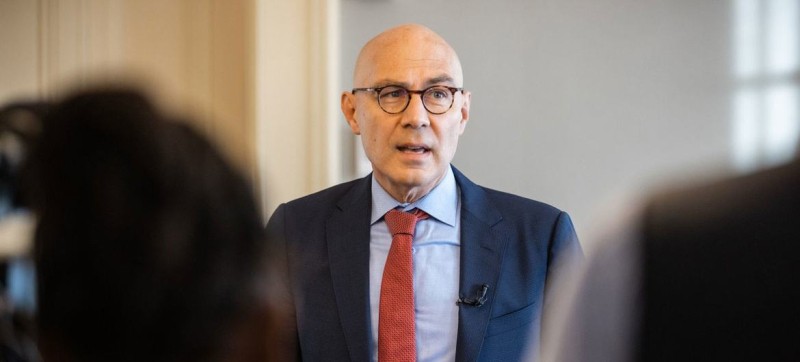Volker Türk United Nations High Commissioner for Human Rights Volker Türk.
“Following my meeting with President [Nicolás] Maduro, he publicly expressed his readiness to work towards improving the justice system. This is a key area for reform, and I offer the support and expertise of my Office to pursue this,” Volker Türk told reporters in Caracas at the end of his three-day visit.
In addition to Mr. Maduro, the UN human rights chief also met with Vice-President Delcy Rodriguez, senior government officials, judicial leaders, opposition figures, civil society actors, indigenous peoples and victims of human rights violations. He came away from these discussions with a sense that all parties recognized the need for reforms.
The High Commissioner said he had also perceived the need for national and international actors and the UN to help Venezuela to overcome its crises. “And also, importantly, the chance to begin to overcome the deep divisions and rebuild the social contract among Venezuelans,” he added.
‘Frank conversations’ on reforms and building trust
“During frank conversations with the authorities, I raised issues relating to civic space, conditions of detention and judicial delays, among others, encouraging them to take meaningful steps towards reforming the justice and security sectors,” said Mr. Türk in a press release issued by the UN human rights office, or OHCHR, which he heads up.
He also encouraged the authorities to take the lead in building trust with victims and civil society organizations, to listen to them, to include them meaningfully in dialogue and respond to the plight of the victims.
To this end, the High Commissioner said that during his visit he had heard accounts of people being arbitrarily detained and tortured, and of family members being killed in security operations and demonstrations. One woman, he said, was overcome with emotion, he explained, as she recounted how two years ago her sister had been detained, raped, and tortured.
Tweet URL
‘End torture once and for all’
“In my meetings with the President and ministers, I called for all people who have been arbitrarily detained to be released. This also forms part of my global call to governments to amnesty, pardon or simply release all those arbitrarily detained for exercising their fundamental human rights,” stressed Mr. Türk.
He said he was given commitments that torture complaints would be addressed “decisively, fully investigated and those responsible brought to justice,” he said, encouraging the authorities to also take decisive steps to end torture once and for all, and to ratify the Optional Protocol to the Convention against Torture, which seeks both to prevent torture and improve conditions in detention.
Socio-economic woes exacerbated by sanctions
“The economic and social challenges Venezuela faces, including with respect to the minimum wage and pensions, and the impact this has on people’s daily lives by curtailing their rights to food, water, healthcare, education, and other economic and social rights, were powerfully conveyed to me in my meetings with civil society, trade unionists and pensioners, among others,” the UN human rights chief continued.
He said he also heard from across the spectrum of people he spoke with, including humanitarian actors and UN agencies, about the impact of sectorial sanctions on the most vulnerable segments of the population and the hurdles sanctions create for the country’s recovery and development, not least in the wake of the COVID-19 pandemic.
“While the roots of Venezuela’s economic crisis predate the imposition of economic sanctions… it is clear that the sectorial sanctions imposed since August 2017 have exacerbated the economic crisis and hindered human rights,” said Mr. Türk, reiterating his recommendation that Member States suspend or lift measures that undermine human rights and that aggravate the humanitarian situation.
Mexico Dialogue
Noting that he had been able to hear from both the Government and the Unitary Platform delegations to the Mexico Dialogue political process, the High Commissioner said that he had reiterated support for the ongoing discussions and stressed the need to listen to victims in the political process.
“While I in no way underestimate the challenges ahead, I urged them to listen to one another and embark on meaningful dialogue to find a common vision for the future … All sides need to think about the future they want for Venezuela and my Office is ready to be a bridge-builder between the State institutions and the people,” he stressed.
As for Venezuelans outside the country, Mr. Türk said that he had encouraged the Venezuelan authorities to continue and strengthen their cooperation with UN agencies to ensure a voluntary, safe and dignified return for all those who seek it.
UDHR75
The High Commissioner also shared some of his overall impressions, including the fragmented, divided state of Venezuelan society; the overriding need and eagerness, expressed by many, to build bridges to try to heal these divides; and the human rights challenges that the country faces in the civil, political, economic, and social spheres.
In all his interactions, Mr. Türk said that he highlighted the importance of the 75th anniversary of the Universal Declaration of Human Rights this year. “This is not a mere date in the diary or a miraculous text, but a real chance to tackle and advance on many long-standing issues, promote dialogue, and foster healing after decades of rupture,” he stated.




Comments are closed.